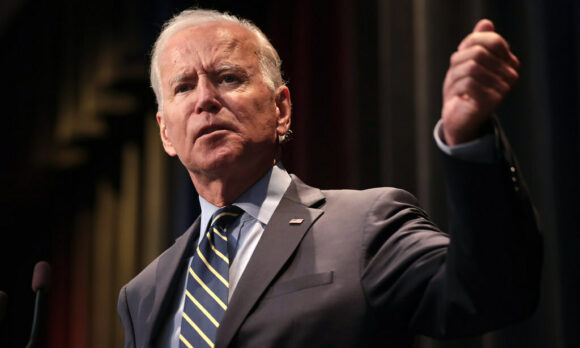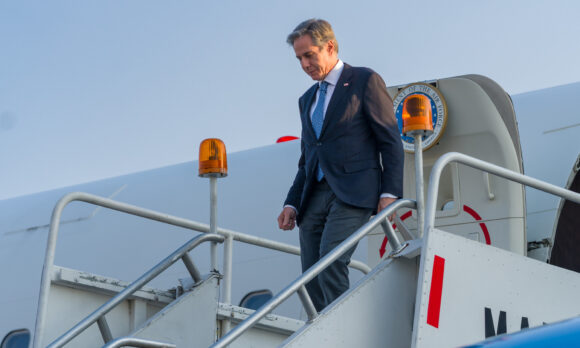November 22, 2023
Sharper: Diplomacy Digest
Analysis from CNAS experts on the most critical challenges for U.S. foreign policy.
How, and with whom, the United States engages matters. From pledges to address climate change with China, to leading hostage releases in Gaza, and cooperating with nations to strengthen democracy through technology, the United States is navigating a complex chessboard of challenges and opportunities. CNAS experts are sharpening the conversation about American diplomacy around the globe. Continue reading this edition of Sharper to explore their ideas and recommendations.
Features
APEC Summit
Last week, the Asia-Pacific Economic Cooperation (APEC) Summit commenced in San Francisco, California, kicking off with a four-hour meeting between U.S. President Joe Biden and General Secretary Xi Jinping. CNAS experts Emily Kilcrease and Jacob Stokes weigh in on the implications of the summit and offer insights into the anticipated meeting.
Digital Allies
Rapid advances in digital and other emerging technologies have become a defining feature of international geopolitics in the 21st century. The United States and South Korea both possess key advantages as leading technological powers and robust democracies. Clearly, technology issues will play a central role in the U.S.-South Korea alliance going forward. In a CNAS paper, authors Jacob Stokes, Alexander Sullivan, and Joshua Fitt explore how the United States and South Korea can broaden and deepen their alliance through expanded cooperation on issues related to technology and innovation.
CNAS Responds: APEC Summit
Today, the Asia-Pacific Economic Cooperation (APEC) Summit commenced in San Francisco, California, kicking off with a four-hour meeting between U.S. President Joe Biden and Ge...
Digital Allies: Deepening U.S.–South Korea Cooperation on Technology and Innovation
Rapid advances in digital and other emerging technologies have become a defining feature of international geopolitics and geoeconomics in the 21st century. This report explore...
How the West Can Court the Global South
Since the Russian invasion of Ukraine in February 2022, many observers have focused on the consolidation of Western unity in responding to Moscow’s aggression. However, attitudes toward the war differ significantly in many places outside of the United States and Europe. The apparent split between the West and the so-called “Global South” has also attracted increasing attention as non-Western countries such as China, India, and Brazil have taken on a more influential role on the world stage. What explains these differing attitudes, and how can the United States and Europe engage the rest of the world productively on key global issues in the years to come? On this episode of Brussels Sprouts Nathalie Tocci and Timothy Garton Ash join Andrea Kendall-Taylor and Jim Townsend to help make sense of all of this and more.
The Spirit of Camp David: Joint Statement of Japan, the Republic of Korea, and the United States
In August the leaders of Japan, the Republic of Korea, and the United States met at Camp David and in a historic joint statement announced their united commitment to strengthening their security cooperation in the Indo-Pacific region. Following the joint statement, CNAS experts provided their analysis and insights on the new trilateral partnership.
How the West Can Court the Global South
Since the Russian invasion of Ukraine in February 2022, many observers have focused on the consolidation of Western unity in responding to Moscow’s aggression. However, attitu...
CNAS Responds: The Spirit of Camp David: Joint Statement of Japan, the Republic of Korea, and the United States
Today, in a historic joint statement, Japan, the Republic of Korea, and the United States announced their united commitment to strengthening their security cooperation in the ...
Commentaries
Hamas Tried to Sabotage Israeli-Saudi Normalization; U.S. Can Make It Backfire
“Hamas’s grisly and barbaric terrorist attack was a transparent effort to forestall a U.S.-Saudi-Israel deal and, more broadly, Israel’s continued integration into the Middle Eastern community of nations,” writes Jonathan Lord in The Hill. “However, the tremendous show of support that Washington has shown and continues to show for Israel, rather than derailing the deal, demonstrates exactly what Riyadh stands to gain by signing on with the U.S. and Israel. By maintaining stalwart support for Israel, the U.S. can further demonstrate to the Saudis the benefit of a normalization deal. This provides all the more reason for the U.S. to aid Israel in its push back against Hamas, and to do so decisively.”
The Dawn of Drone Diplomacy
“With drone use on the rise, states have capitalized on drone exports to increase their global clout,” argues Erik Lin-Greenberg in Foreign Affairs. “To be sure, this is part of an established trend: governments have long leveraged arms exports as a diplomatic tool. Beyond filling state coffers and defraying research and development costs, arms sales help states advance their foreign policy agendas. Selling or donating weapons to like-minded partners can be used to extract concessions, exert influence, counter rivals, and strengthen military ties.”
Institutionalizing Climate Diplomacy in the U.S. State Department’s Foreign Service
“The United States can no longer afford to pursue its climate agenda on an ad hoc basis, responding to each crisis in isolation and mainly committing to climate resiliency in name but not in practice,” writes Jacqueline White Menchaca for CNAS's The Pitch: A Competition of New Ideas. “Instead, the United States should institutionalize its commitment to climate diplomacy by establishing a climate cone, or specialized track, in the U.S. State Department’s Foreign Service that is dedicated to tackling climate change, its security and economic risks, and the challenges of global coordination. Creating this cone will ensure that U.S. Foreign Service officers are trained on the issues and science behind climate change while building U.S. capacity to mitigate the impacts of climate change and restoring leadership in an arena in which the country’s dedication has been inconsistent.“
Hamas Tried to Sabotage Israeli-Saudi Normalization; U.S. Can Make It Backfire
Before Oct. 7, the biggest Middle East story was the growing prospect of a normalization agreement between the U.S., Saudi Arabia, and Israel. The thawing of Saudi-Israeli rel...
The Dawn of Drone Diplomacy
A new era of arms trade is emerging, in which new exporters such as Iran and Turkey are displacing traditional weapons suppliers and are using drone exports to extend influenc...
Institutionalizing Climate Diplomacy in the U.S. State Department’s Foreign Service
This commentary piece is part of CNAS' The Pitch: A Competition of New Ideas. The author, Jacqueline White Menchaca, won the People’s Choice Award at the 2022 competition. The...
In the News
Commentary and analysis from Emily Kilcrease, Andrea Kendall-Taylor, Jonathan Lord, Lisa Curtis, and Jacob Stokes.
Biden’s ‘Bear Hug Diplomacy’ in Israel Risks Stoking Anger in Arab World
But Jonathan Lord, director of the Middle East security program at the Center for a New American Security, said it was important for the U.S. to stand by its ally after the ho...
Joe Biden and Xi Jinping to Meet in Effort to Stabilize Relations
Over the past few months, several US cabinet secretaries have visited Beijing, partly in recognition that Washington needed to boost high-level engagement to reduce miscommuni...
Biden warmly welcomes India's Modi despite questions about human rights issues
"I think that the Biden administration has been willing to set aside their differences over Russia because they really are playing a long game with India. And they see China a...
Jake Sullivan's Trial by Combat
In some sense, the President’s instructions have been clear from the beginning: No U.S. boots on the ground; no supplying weapons for the purpose of attacking Russian territor...
Analysis: Is the U.S. Strategy of Engaging China Working?
Jacob Stokes, senior fellow in the Indo-Pacific Security Program at the Center for a New American Security, said the administration's China policy had been a success. "The app...
About the Sharper Series
The CNAS Sharper series features curated analysis and commentary from CNAS experts on the most critical challenges in U.S. foreign policy. From the future of America's relationship with China to the state of U.S. sanctions policy and more, each collection draws on the reports, interviews, and other commentaries produced by experts across the Center to explore how America can strengthen its competitive edge.
Subscribe
Sign up to receive the latest analysis from the CNAS expert community on the most important issues facing America's national security.











